Examining Support Strategies for Dementia and Bereavement Cases
VerifiedAdded on 2024/06/07
|24
|5159
|229
Essay
AI Summary
This essay explores the impact of significant life events like dementia and bereavement, focusing on the experiences of individuals like Jacqui who suffer from Alzheimer's. It analyzes the physical, psychological, and social impacts on sufferers, examining different group responses, including those of family, friends, caregivers, and organizations like the National Health Service. The essay evaluates the effectiveness of organizational policies and procedures in supporting dementia sufferers and bereaved individuals, with personal reflections on professional contributions in healthcare. It highlights the challenges faced by caregivers, including potential abuse and emotional strain, and emphasizes the importance of training and support for both patients and caregivers. The essay concludes by underscoring the need for comprehensive and compassionate care to improve the well-being of those affected by dementia and bereavement. Desklib provides past papers and solved assignments for students.

Supporting Significant Life Events
1
1
Paraphrase This Document
Need a fresh take? Get an instant paraphrase of this document with our AI Paraphraser

Table of Contents
Introduction......................................................................................................................................3
Part 1................................................................................................................................................4
Part 2................................................................................................................................................8
Part 3..............................................................................................................................................12
Conclusion.....................................................................................................................................13
Reference List................................................................................................................................14
Appendix........................................................................................................................................16
2
Introduction......................................................................................................................................3
Part 1................................................................................................................................................4
Part 2................................................................................................................................................8
Part 3..............................................................................................................................................12
Conclusion.....................................................................................................................................13
Reference List................................................................................................................................14
Appendix........................................................................................................................................16
2
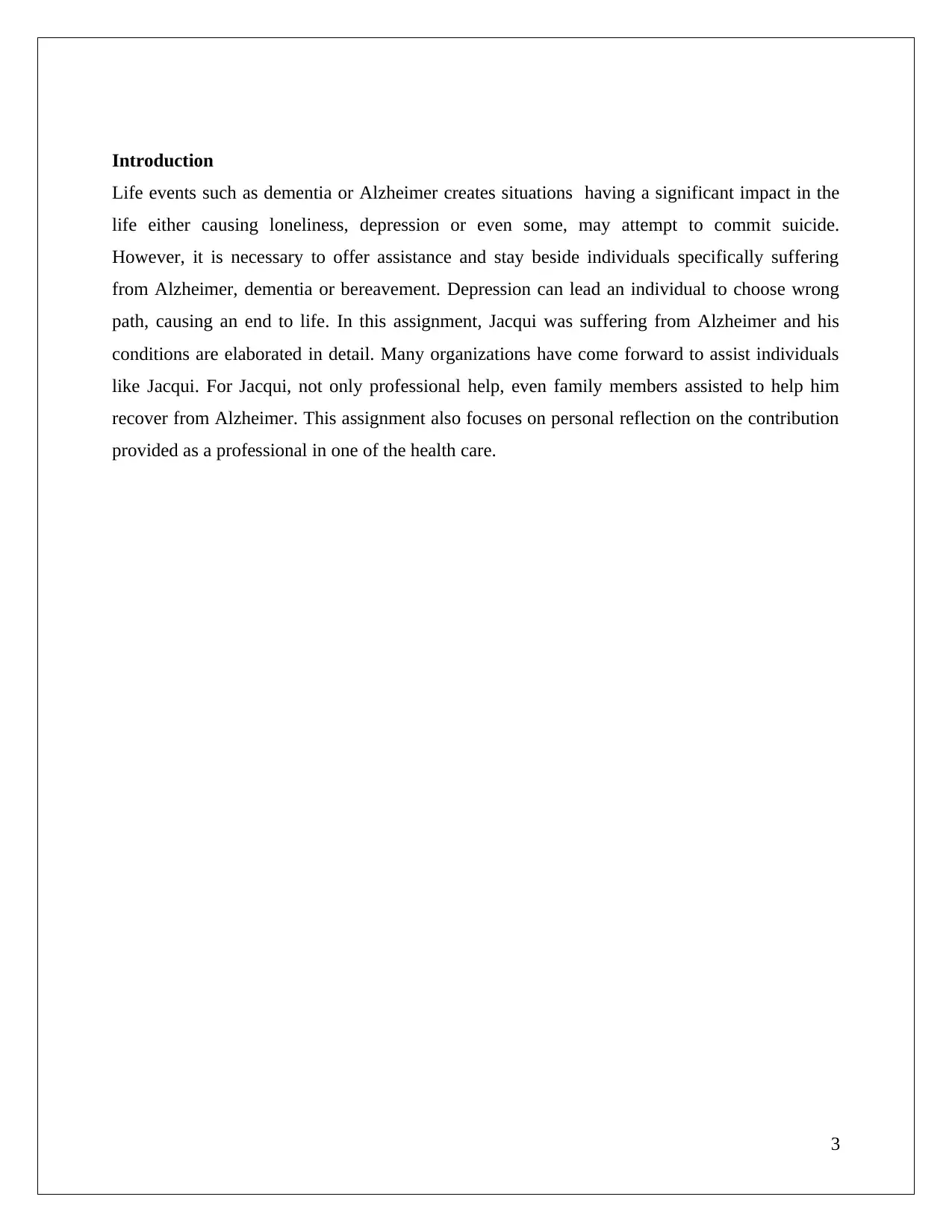
Introduction
Life events such as dementia or Alzheimer creates situations having a significant impact in the
life either causing loneliness, depression or even some, may attempt to commit suicide.
However, it is necessary to offer assistance and stay beside individuals specifically suffering
from Alzheimer, dementia or bereavement. Depression can lead an individual to choose wrong
path, causing an end to life. In this assignment, Jacqui was suffering from Alzheimer and his
conditions are elaborated in detail. Many organizations have come forward to assist individuals
like Jacqui. For Jacqui, not only professional help, even family members assisted to help him
recover from Alzheimer. This assignment also focuses on personal reflection on the contribution
provided as a professional in one of the health care.
3
Life events such as dementia or Alzheimer creates situations having a significant impact in the
life either causing loneliness, depression or even some, may attempt to commit suicide.
However, it is necessary to offer assistance and stay beside individuals specifically suffering
from Alzheimer, dementia or bereavement. Depression can lead an individual to choose wrong
path, causing an end to life. In this assignment, Jacqui was suffering from Alzheimer and his
conditions are elaborated in detail. Many organizations have come forward to assist individuals
like Jacqui. For Jacqui, not only professional help, even family members assisted to help him
recover from Alzheimer. This assignment also focuses on personal reflection on the contribution
provided as a professional in one of the health care.
3
⊘ This is a preview!⊘
Do you want full access?
Subscribe today to unlock all pages.

Trusted by 1+ million students worldwide
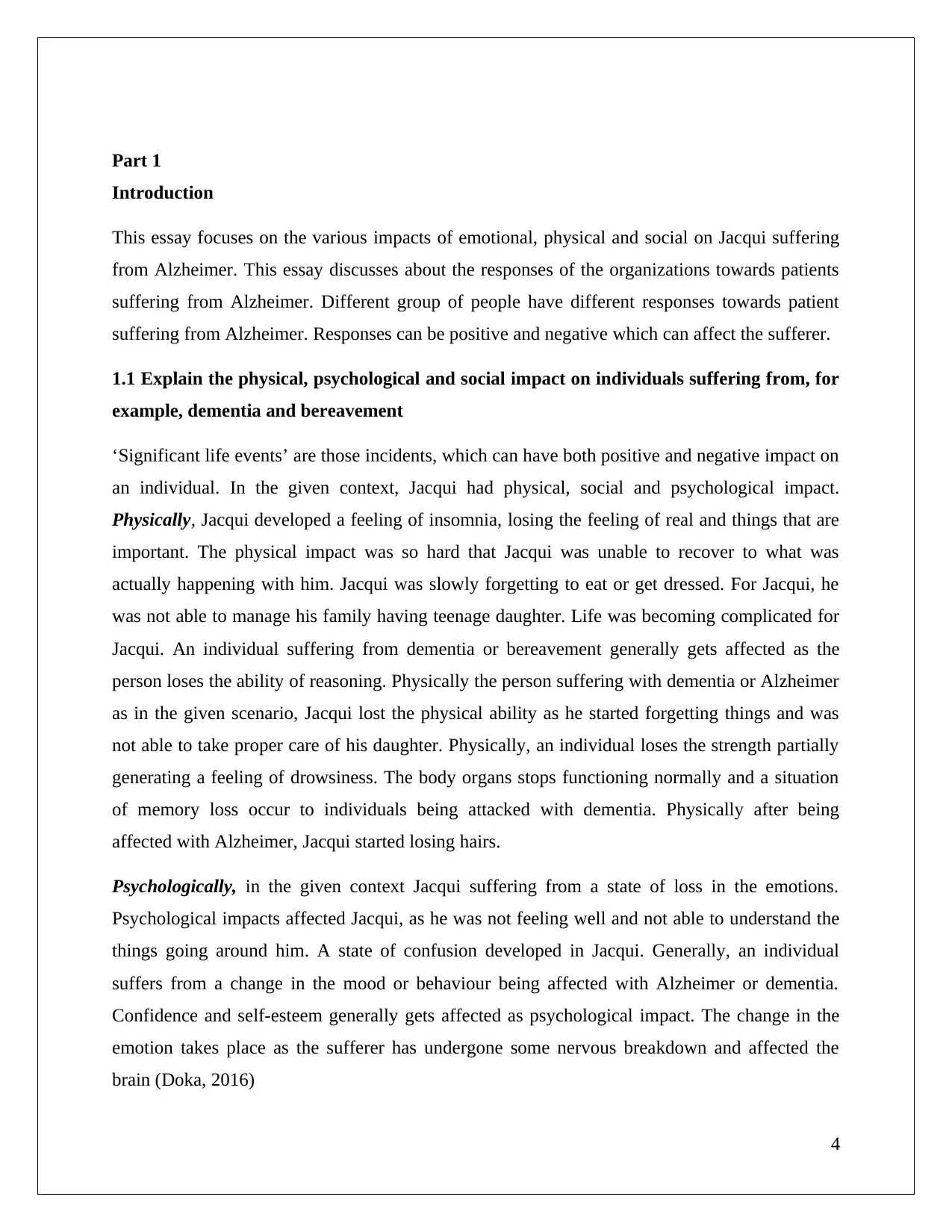
Part 1
Introduction
This essay focuses on the various impacts of emotional, physical and social on Jacqui suffering
from Alzheimer. This essay discusses about the responses of the organizations towards patients
suffering from Alzheimer. Different group of people have different responses towards patient
suffering from Alzheimer. Responses can be positive and negative which can affect the sufferer.
1.1 Explain the physical, psychological and social impact on individuals suffering from, for
example, dementia and bereavement
‘Significant life events’ are those incidents, which can have both positive and negative impact on
an individual. In the given context, Jacqui had physical, social and psychological impact.
Physically, Jacqui developed a feeling of insomnia, losing the feeling of real and things that are
important. The physical impact was so hard that Jacqui was unable to recover to what was
actually happening with him. Jacqui was slowly forgetting to eat or get dressed. For Jacqui, he
was not able to manage his family having teenage daughter. Life was becoming complicated for
Jacqui. An individual suffering from dementia or bereavement generally gets affected as the
person loses the ability of reasoning. Physically the person suffering with dementia or Alzheimer
as in the given scenario, Jacqui lost the physical ability as he started forgetting things and was
not able to take proper care of his daughter. Physically, an individual loses the strength partially
generating a feeling of drowsiness. The body organs stops functioning normally and a situation
of memory loss occur to individuals being attacked with dementia. Physically after being
affected with Alzheimer, Jacqui started losing hairs.
Psychologically, in the given context Jacqui suffering from a state of loss in the emotions.
Psychological impacts affected Jacqui, as he was not feeling well and not able to understand the
things going around him. A state of confusion developed in Jacqui. Generally, an individual
suffers from a change in the mood or behaviour being affected with Alzheimer or dementia.
Confidence and self-esteem generally gets affected as psychological impact. The change in the
emotion takes place as the sufferer has undergone some nervous breakdown and affected the
brain (Doka, 2016)
4
Introduction
This essay focuses on the various impacts of emotional, physical and social on Jacqui suffering
from Alzheimer. This essay discusses about the responses of the organizations towards patients
suffering from Alzheimer. Different group of people have different responses towards patient
suffering from Alzheimer. Responses can be positive and negative which can affect the sufferer.
1.1 Explain the physical, psychological and social impact on individuals suffering from, for
example, dementia and bereavement
‘Significant life events’ are those incidents, which can have both positive and negative impact on
an individual. In the given context, Jacqui had physical, social and psychological impact.
Physically, Jacqui developed a feeling of insomnia, losing the feeling of real and things that are
important. The physical impact was so hard that Jacqui was unable to recover to what was
actually happening with him. Jacqui was slowly forgetting to eat or get dressed. For Jacqui, he
was not able to manage his family having teenage daughter. Life was becoming complicated for
Jacqui. An individual suffering from dementia or bereavement generally gets affected as the
person loses the ability of reasoning. Physically the person suffering with dementia or Alzheimer
as in the given scenario, Jacqui lost the physical ability as he started forgetting things and was
not able to take proper care of his daughter. Physically, an individual loses the strength partially
generating a feeling of drowsiness. The body organs stops functioning normally and a situation
of memory loss occur to individuals being attacked with dementia. Physically after being
affected with Alzheimer, Jacqui started losing hairs.
Psychologically, in the given context Jacqui suffering from a state of loss in the emotions.
Psychological impacts affected Jacqui, as he was not feeling well and not able to understand the
things going around him. A state of confusion developed in Jacqui. Generally, an individual
suffers from a change in the mood or behaviour being affected with Alzheimer or dementia.
Confidence and self-esteem generally gets affected as psychological impact. The change in the
emotion takes place as the sufferer has undergone some nervous breakdown and affected the
brain (Doka, 2016)
4
Paraphrase This Document
Need a fresh take? Get an instant paraphrase of this document with our AI Paraphraser
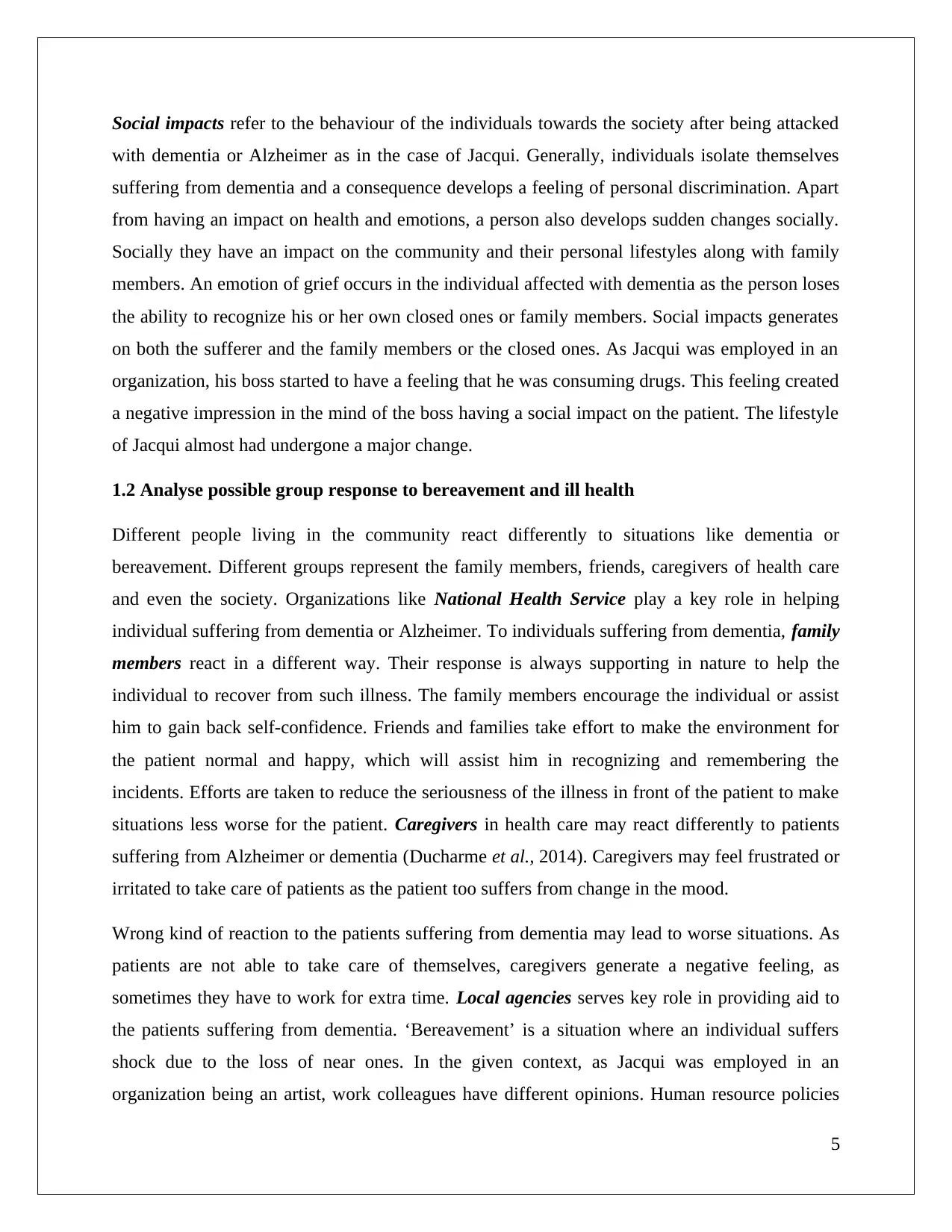
Social impacts refer to the behaviour of the individuals towards the society after being attacked
with dementia or Alzheimer as in the case of Jacqui. Generally, individuals isolate themselves
suffering from dementia and a consequence develops a feeling of personal discrimination. Apart
from having an impact on health and emotions, a person also develops sudden changes socially.
Socially they have an impact on the community and their personal lifestyles along with family
members. An emotion of grief occurs in the individual affected with dementia as the person loses
the ability to recognize his or her own closed ones or family members. Social impacts generates
on both the sufferer and the family members or the closed ones. As Jacqui was employed in an
organization, his boss started to have a feeling that he was consuming drugs. This feeling created
a negative impression in the mind of the boss having a social impact on the patient. The lifestyle
of Jacqui almost had undergone a major change.
1.2 Analyse possible group response to bereavement and ill health
Different people living in the community react differently to situations like dementia or
bereavement. Different groups represent the family members, friends, caregivers of health care
and even the society. Organizations like National Health Service play a key role in helping
individual suffering from dementia or Alzheimer. To individuals suffering from dementia, family
members react in a different way. Their response is always supporting in nature to help the
individual to recover from such illness. The family members encourage the individual or assist
him to gain back self-confidence. Friends and families take effort to make the environment for
the patient normal and happy, which will assist him in recognizing and remembering the
incidents. Efforts are taken to reduce the seriousness of the illness in front of the patient to make
situations less worse for the patient. Caregivers in health care may react differently to patients
suffering from Alzheimer or dementia (Ducharme et al., 2014). Caregivers may feel frustrated or
irritated to take care of patients as the patient too suffers from change in the mood.
Wrong kind of reaction to the patients suffering from dementia may lead to worse situations. As
patients are not able to take care of themselves, caregivers generate a negative feeling, as
sometimes they have to work for extra time. Local agencies serves key role in providing aid to
the patients suffering from dementia. ‘Bereavement’ is a situation where an individual suffers
shock due to the loss of near ones. In the given context, as Jacqui was employed in an
organization being an artist, work colleagues have different opinions. Human resource policies
5
with dementia or Alzheimer as in the case of Jacqui. Generally, individuals isolate themselves
suffering from dementia and a consequence develops a feeling of personal discrimination. Apart
from having an impact on health and emotions, a person also develops sudden changes socially.
Socially they have an impact on the community and their personal lifestyles along with family
members. An emotion of grief occurs in the individual affected with dementia as the person loses
the ability to recognize his or her own closed ones or family members. Social impacts generates
on both the sufferer and the family members or the closed ones. As Jacqui was employed in an
organization, his boss started to have a feeling that he was consuming drugs. This feeling created
a negative impression in the mind of the boss having a social impact on the patient. The lifestyle
of Jacqui almost had undergone a major change.
1.2 Analyse possible group response to bereavement and ill health
Different people living in the community react differently to situations like dementia or
bereavement. Different groups represent the family members, friends, caregivers of health care
and even the society. Organizations like National Health Service play a key role in helping
individual suffering from dementia or Alzheimer. To individuals suffering from dementia, family
members react in a different way. Their response is always supporting in nature to help the
individual to recover from such illness. The family members encourage the individual or assist
him to gain back self-confidence. Friends and families take effort to make the environment for
the patient normal and happy, which will assist him in recognizing and remembering the
incidents. Efforts are taken to reduce the seriousness of the illness in front of the patient to make
situations less worse for the patient. Caregivers in health care may react differently to patients
suffering from Alzheimer or dementia (Ducharme et al., 2014). Caregivers may feel frustrated or
irritated to take care of patients as the patient too suffers from change in the mood.
Wrong kind of reaction to the patients suffering from dementia may lead to worse situations. As
patients are not able to take care of themselves, caregivers generate a negative feeling, as
sometimes they have to work for extra time. Local agencies serves key role in providing aid to
the patients suffering from dementia. ‘Bereavement’ is a situation where an individual suffers
shock due to the loss of near ones. In the given context, as Jacqui was employed in an
organization being an artist, work colleagues have different opinions. Human resource policies
5
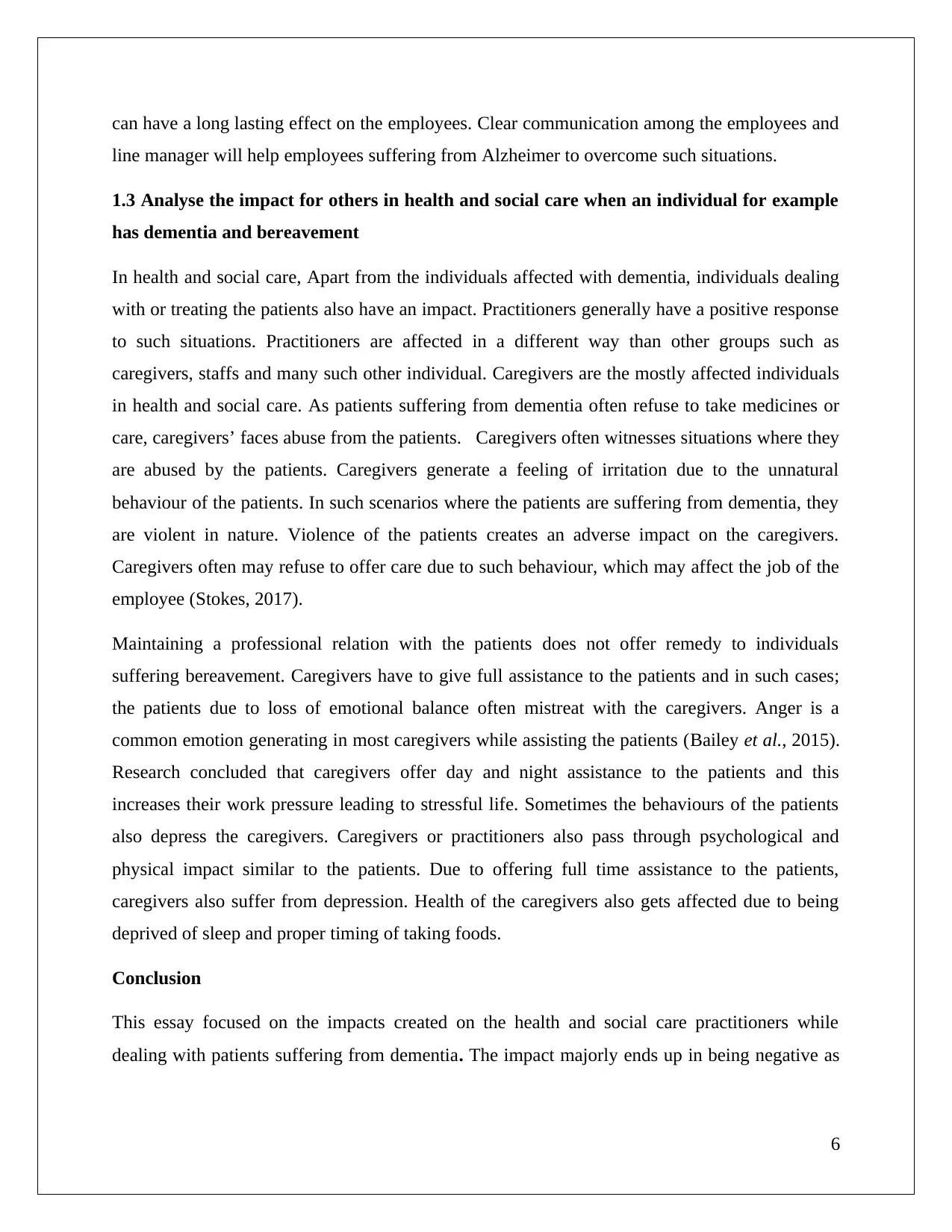
can have a long lasting effect on the employees. Clear communication among the employees and
line manager will help employees suffering from Alzheimer to overcome such situations.
1.3 Analyse the impact for others in health and social care when an individual for example
has dementia and bereavement
In health and social care, Apart from the individuals affected with dementia, individuals dealing
with or treating the patients also have an impact. Practitioners generally have a positive response
to such situations. Practitioners are affected in a different way than other groups such as
caregivers, staffs and many such other individual. Caregivers are the mostly affected individuals
in health and social care. As patients suffering from dementia often refuse to take medicines or
care, caregivers’ faces abuse from the patients. Caregivers often witnesses situations where they
are abused by the patients. Caregivers generate a feeling of irritation due to the unnatural
behaviour of the patients. In such scenarios where the patients are suffering from dementia, they
are violent in nature. Violence of the patients creates an adverse impact on the caregivers.
Caregivers often may refuse to offer care due to such behaviour, which may affect the job of the
employee (Stokes, 2017).
Maintaining a professional relation with the patients does not offer remedy to individuals
suffering bereavement. Caregivers have to give full assistance to the patients and in such cases;
the patients due to loss of emotional balance often mistreat with the caregivers. Anger is a
common emotion generating in most caregivers while assisting the patients (Bailey et al., 2015).
Research concluded that caregivers offer day and night assistance to the patients and this
increases their work pressure leading to stressful life. Sometimes the behaviours of the patients
also depress the caregivers. Caregivers or practitioners also pass through psychological and
physical impact similar to the patients. Due to offering full time assistance to the patients,
caregivers also suffer from depression. Health of the caregivers also gets affected due to being
deprived of sleep and proper timing of taking foods.
Conclusion
This essay focused on the impacts created on the health and social care practitioners while
dealing with patients suffering from dementia. The impact majorly ends up in being negative as
6
line manager will help employees suffering from Alzheimer to overcome such situations.
1.3 Analyse the impact for others in health and social care when an individual for example
has dementia and bereavement
In health and social care, Apart from the individuals affected with dementia, individuals dealing
with or treating the patients also have an impact. Practitioners generally have a positive response
to such situations. Practitioners are affected in a different way than other groups such as
caregivers, staffs and many such other individual. Caregivers are the mostly affected individuals
in health and social care. As patients suffering from dementia often refuse to take medicines or
care, caregivers’ faces abuse from the patients. Caregivers often witnesses situations where they
are abused by the patients. Caregivers generate a feeling of irritation due to the unnatural
behaviour of the patients. In such scenarios where the patients are suffering from dementia, they
are violent in nature. Violence of the patients creates an adverse impact on the caregivers.
Caregivers often may refuse to offer care due to such behaviour, which may affect the job of the
employee (Stokes, 2017).
Maintaining a professional relation with the patients does not offer remedy to individuals
suffering bereavement. Caregivers have to give full assistance to the patients and in such cases;
the patients due to loss of emotional balance often mistreat with the caregivers. Anger is a
common emotion generating in most caregivers while assisting the patients (Bailey et al., 2015).
Research concluded that caregivers offer day and night assistance to the patients and this
increases their work pressure leading to stressful life. Sometimes the behaviours of the patients
also depress the caregivers. Caregivers or practitioners also pass through psychological and
physical impact similar to the patients. Due to offering full time assistance to the patients,
caregivers also suffer from depression. Health of the caregivers also gets affected due to being
deprived of sleep and proper timing of taking foods.
Conclusion
This essay focused on the impacts created on the health and social care practitioners while
dealing with patients suffering from dementia. The impact majorly ends up in being negative as
6
⊘ This is a preview!⊘
Do you want full access?
Subscribe today to unlock all pages.

Trusted by 1+ million students worldwide

dementia patients react in an abnormal manner and can even be abusive some times. This essay
highlights on the responses given by different groups about the patient’s condition.
7
highlights on the responses given by different groups about the patient’s condition.
7
Paraphrase This Document
Need a fresh take? Get an instant paraphrase of this document with our AI Paraphraser
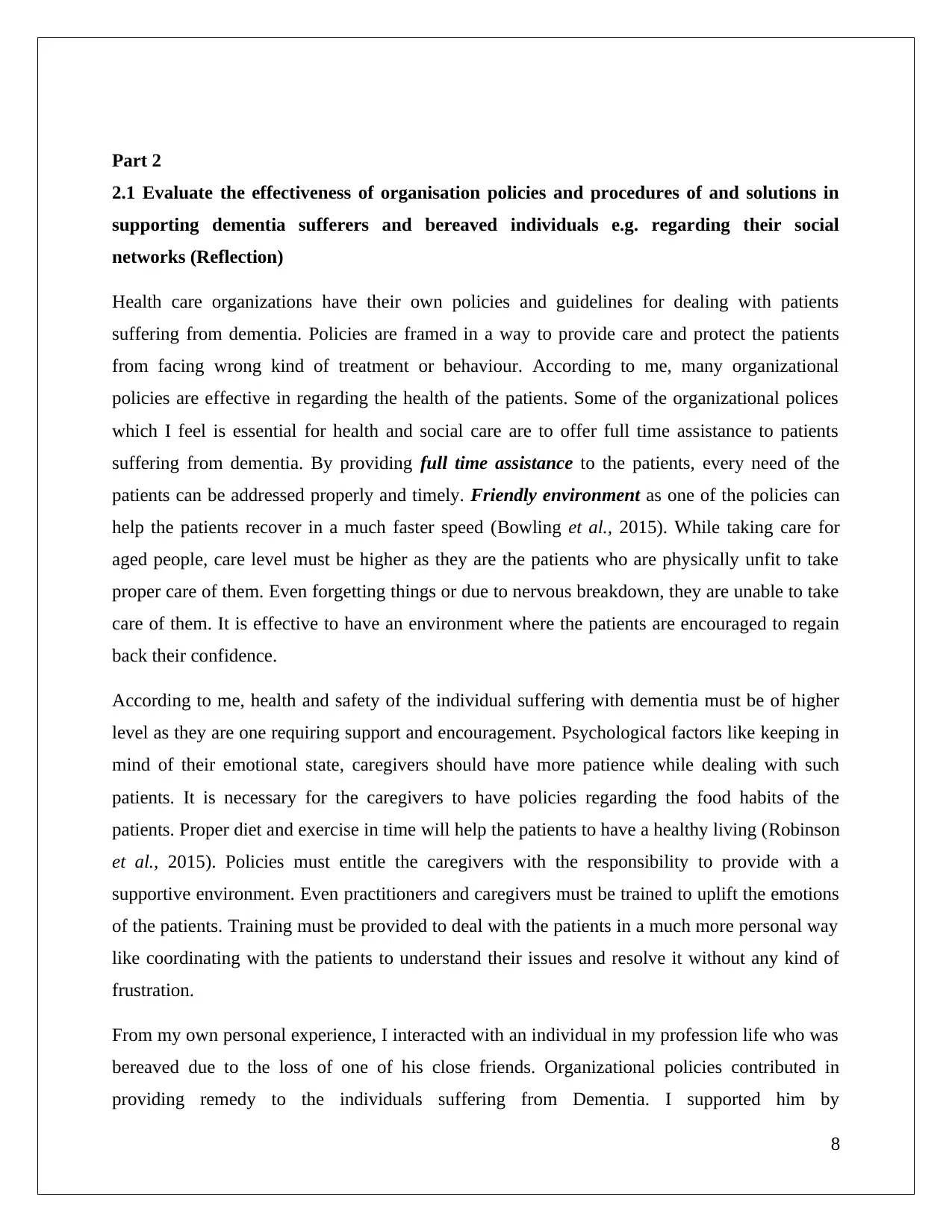
Part 2
2.1 Evaluate the effectiveness of organisation policies and procedures of and solutions in
supporting dementia sufferers and bereaved individuals e.g. regarding their social
networks (Reflection)
Health care organizations have their own policies and guidelines for dealing with patients
suffering from dementia. Policies are framed in a way to provide care and protect the patients
from facing wrong kind of treatment or behaviour. According to me, many organizational
policies are effective in regarding the health of the patients. Some of the organizational polices
which I feel is essential for health and social care are to offer full time assistance to patients
suffering from dementia. By providing full time assistance to the patients, every need of the
patients can be addressed properly and timely. Friendly environment as one of the policies can
help the patients recover in a much faster speed (Bowling et al., 2015). While taking care for
aged people, care level must be higher as they are the patients who are physically unfit to take
proper care of them. Even forgetting things or due to nervous breakdown, they are unable to take
care of them. It is effective to have an environment where the patients are encouraged to regain
back their confidence.
According to me, health and safety of the individual suffering with dementia must be of higher
level as they are one requiring support and encouragement. Psychological factors like keeping in
mind of their emotional state, caregivers should have more patience while dealing with such
patients. It is necessary for the caregivers to have policies regarding the food habits of the
patients. Proper diet and exercise in time will help the patients to have a healthy living (Robinson
et al., 2015). Policies must entitle the caregivers with the responsibility to provide with a
supportive environment. Even practitioners and caregivers must be trained to uplift the emotions
of the patients. Training must be provided to deal with the patients in a much more personal way
like coordinating with the patients to understand their issues and resolve it without any kind of
frustration.
From my own personal experience, I interacted with an individual in my profession life who was
bereaved due to the loss of one of his close friends. Organizational policies contributed in
providing remedy to the individuals suffering from Dementia. I supported him by
8
2.1 Evaluate the effectiveness of organisation policies and procedures of and solutions in
supporting dementia sufferers and bereaved individuals e.g. regarding their social
networks (Reflection)
Health care organizations have their own policies and guidelines for dealing with patients
suffering from dementia. Policies are framed in a way to provide care and protect the patients
from facing wrong kind of treatment or behaviour. According to me, many organizational
policies are effective in regarding the health of the patients. Some of the organizational polices
which I feel is essential for health and social care are to offer full time assistance to patients
suffering from dementia. By providing full time assistance to the patients, every need of the
patients can be addressed properly and timely. Friendly environment as one of the policies can
help the patients recover in a much faster speed (Bowling et al., 2015). While taking care for
aged people, care level must be higher as they are the patients who are physically unfit to take
proper care of them. Even forgetting things or due to nervous breakdown, they are unable to take
care of them. It is effective to have an environment where the patients are encouraged to regain
back their confidence.
According to me, health and safety of the individual suffering with dementia must be of higher
level as they are one requiring support and encouragement. Psychological factors like keeping in
mind of their emotional state, caregivers should have more patience while dealing with such
patients. It is necessary for the caregivers to have policies regarding the food habits of the
patients. Proper diet and exercise in time will help the patients to have a healthy living (Robinson
et al., 2015). Policies must entitle the caregivers with the responsibility to provide with a
supportive environment. Even practitioners and caregivers must be trained to uplift the emotions
of the patients. Training must be provided to deal with the patients in a much more personal way
like coordinating with the patients to understand their issues and resolve it without any kind of
frustration.
From my own personal experience, I interacted with an individual in my profession life who was
bereaved due to the loss of one of his close friends. Organizational policies contributed in
providing remedy to the individuals suffering from Dementia. I supported him by
8
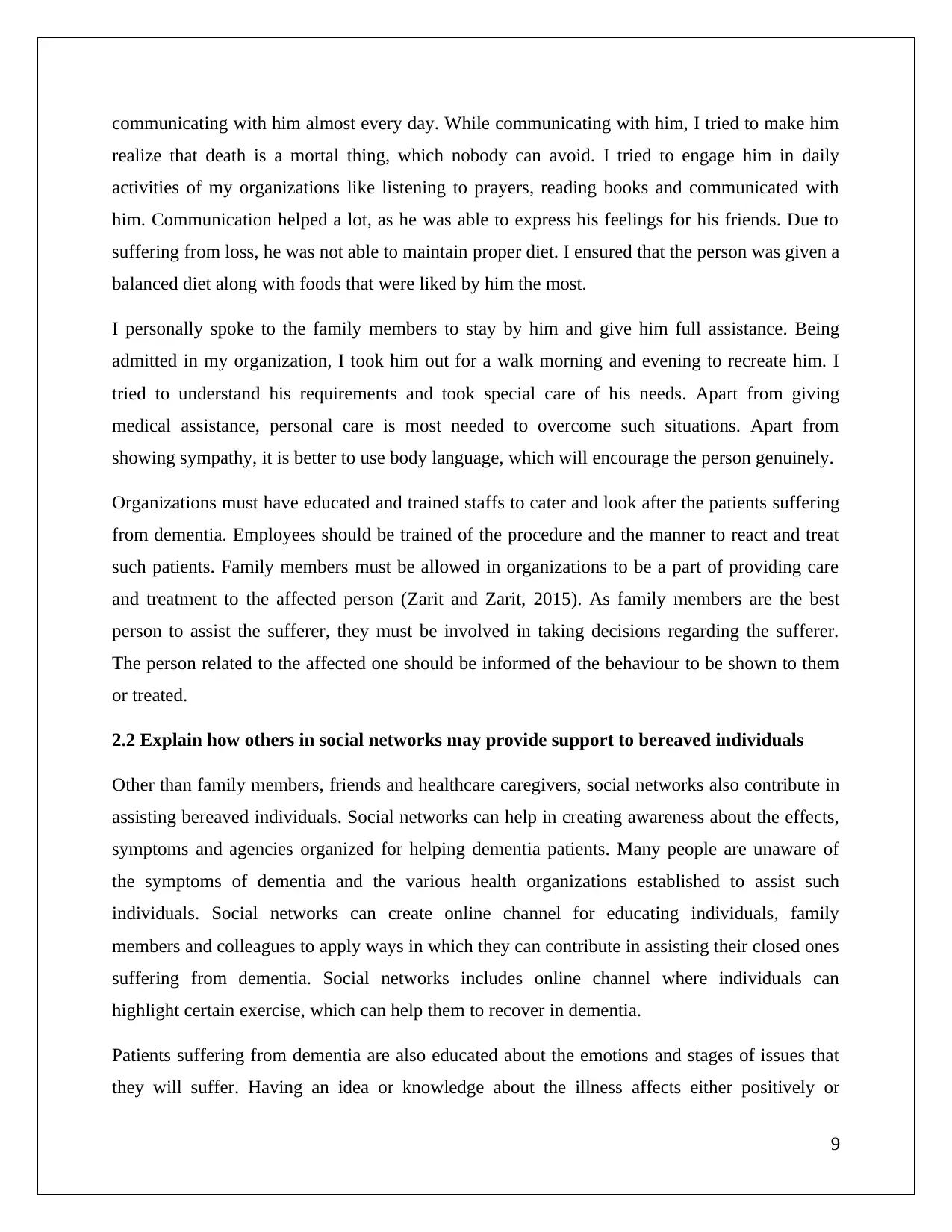
communicating with him almost every day. While communicating with him, I tried to make him
realize that death is a mortal thing, which nobody can avoid. I tried to engage him in daily
activities of my organizations like listening to prayers, reading books and communicated with
him. Communication helped a lot, as he was able to express his feelings for his friends. Due to
suffering from loss, he was not able to maintain proper diet. I ensured that the person was given a
balanced diet along with foods that were liked by him the most.
I personally spoke to the family members to stay by him and give him full assistance. Being
admitted in my organization, I took him out for a walk morning and evening to recreate him. I
tried to understand his requirements and took special care of his needs. Apart from giving
medical assistance, personal care is most needed to overcome such situations. Apart from
showing sympathy, it is better to use body language, which will encourage the person genuinely.
Organizations must have educated and trained staffs to cater and look after the patients suffering
from dementia. Employees should be trained of the procedure and the manner to react and treat
such patients. Family members must be allowed in organizations to be a part of providing care
and treatment to the affected person (Zarit and Zarit, 2015). As family members are the best
person to assist the sufferer, they must be involved in taking decisions regarding the sufferer.
The person related to the affected one should be informed of the behaviour to be shown to them
or treated.
2.2 Explain how others in social networks may provide support to bereaved individuals
Other than family members, friends and healthcare caregivers, social networks also contribute in
assisting bereaved individuals. Social networks can help in creating awareness about the effects,
symptoms and agencies organized for helping dementia patients. Many people are unaware of
the symptoms of dementia and the various health organizations established to assist such
individuals. Social networks can create online channel for educating individuals, family
members and colleagues to apply ways in which they can contribute in assisting their closed ones
suffering from dementia. Social networks includes online channel where individuals can
highlight certain exercise, which can help them to recover in dementia.
Patients suffering from dementia are also educated about the emotions and stages of issues that
they will suffer. Having an idea or knowledge about the illness affects either positively or
9
realize that death is a mortal thing, which nobody can avoid. I tried to engage him in daily
activities of my organizations like listening to prayers, reading books and communicated with
him. Communication helped a lot, as he was able to express his feelings for his friends. Due to
suffering from loss, he was not able to maintain proper diet. I ensured that the person was given a
balanced diet along with foods that were liked by him the most.
I personally spoke to the family members to stay by him and give him full assistance. Being
admitted in my organization, I took him out for a walk morning and evening to recreate him. I
tried to understand his requirements and took special care of his needs. Apart from giving
medical assistance, personal care is most needed to overcome such situations. Apart from
showing sympathy, it is better to use body language, which will encourage the person genuinely.
Organizations must have educated and trained staffs to cater and look after the patients suffering
from dementia. Employees should be trained of the procedure and the manner to react and treat
such patients. Family members must be allowed in organizations to be a part of providing care
and treatment to the affected person (Zarit and Zarit, 2015). As family members are the best
person to assist the sufferer, they must be involved in taking decisions regarding the sufferer.
The person related to the affected one should be informed of the behaviour to be shown to them
or treated.
2.2 Explain how others in social networks may provide support to bereaved individuals
Other than family members, friends and healthcare caregivers, social networks also contribute in
assisting bereaved individuals. Social networks can help in creating awareness about the effects,
symptoms and agencies organized for helping dementia patients. Many people are unaware of
the symptoms of dementia and the various health organizations established to assist such
individuals. Social networks can create online channel for educating individuals, family
members and colleagues to apply ways in which they can contribute in assisting their closed ones
suffering from dementia. Social networks includes online channel where individuals can
highlight certain exercise, which can help them to recover in dementia.
Patients suffering from dementia are also educated about the emotions and stages of issues that
they will suffer. Having an idea or knowledge about the illness affects either positively or
9
⊘ This is a preview!⊘
Do you want full access?
Subscribe today to unlock all pages.

Trusted by 1+ million students worldwide
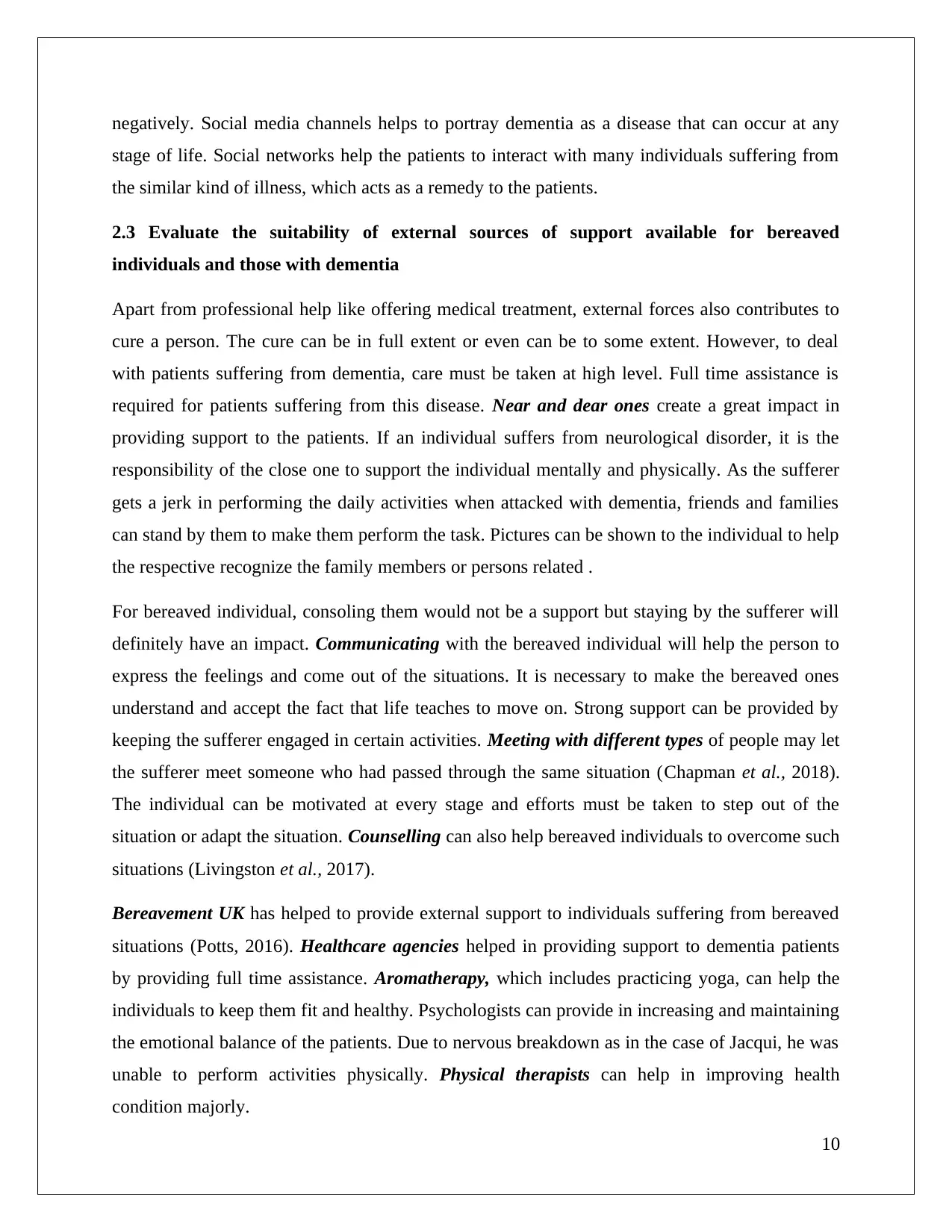
negatively. Social media channels helps to portray dementia as a disease that can occur at any
stage of life. Social networks help the patients to interact with many individuals suffering from
the similar kind of illness, which acts as a remedy to the patients.
2.3 Evaluate the suitability of external sources of support available for bereaved
individuals and those with dementia
Apart from professional help like offering medical treatment, external forces also contributes to
cure a person. The cure can be in full extent or even can be to some extent. However, to deal
with patients suffering from dementia, care must be taken at high level. Full time assistance is
required for patients suffering from this disease. Near and dear ones create a great impact in
providing support to the patients. If an individual suffers from neurological disorder, it is the
responsibility of the close one to support the individual mentally and physically. As the sufferer
gets a jerk in performing the daily activities when attacked with dementia, friends and families
can stand by them to make them perform the task. Pictures can be shown to the individual to help
the respective recognize the family members or persons related .
For bereaved individual, consoling them would not be a support but staying by the sufferer will
definitely have an impact. Communicating with the bereaved individual will help the person to
express the feelings and come out of the situations. It is necessary to make the bereaved ones
understand and accept the fact that life teaches to move on. Strong support can be provided by
keeping the sufferer engaged in certain activities. Meeting with different types of people may let
the sufferer meet someone who had passed through the same situation (Chapman et al., 2018).
The individual can be motivated at every stage and efforts must be taken to step out of the
situation or adapt the situation. Counselling can also help bereaved individuals to overcome such
situations (Livingston et al., 2017).
Bereavement UK has helped to provide external support to individuals suffering from bereaved
situations (Potts, 2016). Healthcare agencies helped in providing support to dementia patients
by providing full time assistance. Aromatherapy, which includes practicing yoga, can help the
individuals to keep them fit and healthy. Psychologists can provide in increasing and maintaining
the emotional balance of the patients. Due to nervous breakdown as in the case of Jacqui, he was
unable to perform activities physically. Physical therapists can help in improving health
condition majorly.
10
stage of life. Social networks help the patients to interact with many individuals suffering from
the similar kind of illness, which acts as a remedy to the patients.
2.3 Evaluate the suitability of external sources of support available for bereaved
individuals and those with dementia
Apart from professional help like offering medical treatment, external forces also contributes to
cure a person. The cure can be in full extent or even can be to some extent. However, to deal
with patients suffering from dementia, care must be taken at high level. Full time assistance is
required for patients suffering from this disease. Near and dear ones create a great impact in
providing support to the patients. If an individual suffers from neurological disorder, it is the
responsibility of the close one to support the individual mentally and physically. As the sufferer
gets a jerk in performing the daily activities when attacked with dementia, friends and families
can stand by them to make them perform the task. Pictures can be shown to the individual to help
the respective recognize the family members or persons related .
For bereaved individual, consoling them would not be a support but staying by the sufferer will
definitely have an impact. Communicating with the bereaved individual will help the person to
express the feelings and come out of the situations. It is necessary to make the bereaved ones
understand and accept the fact that life teaches to move on. Strong support can be provided by
keeping the sufferer engaged in certain activities. Meeting with different types of people may let
the sufferer meet someone who had passed through the same situation (Chapman et al., 2018).
The individual can be motivated at every stage and efforts must be taken to step out of the
situation or adapt the situation. Counselling can also help bereaved individuals to overcome such
situations (Livingston et al., 2017).
Bereavement UK has helped to provide external support to individuals suffering from bereaved
situations (Potts, 2016). Healthcare agencies helped in providing support to dementia patients
by providing full time assistance. Aromatherapy, which includes practicing yoga, can help the
individuals to keep them fit and healthy. Psychologists can provide in increasing and maintaining
the emotional balance of the patients. Due to nervous breakdown as in the case of Jacqui, he was
unable to perform activities physically. Physical therapists can help in improving health
condition majorly.
10
Paraphrase This Document
Need a fresh take? Get an instant paraphrase of this document with our AI Paraphraser
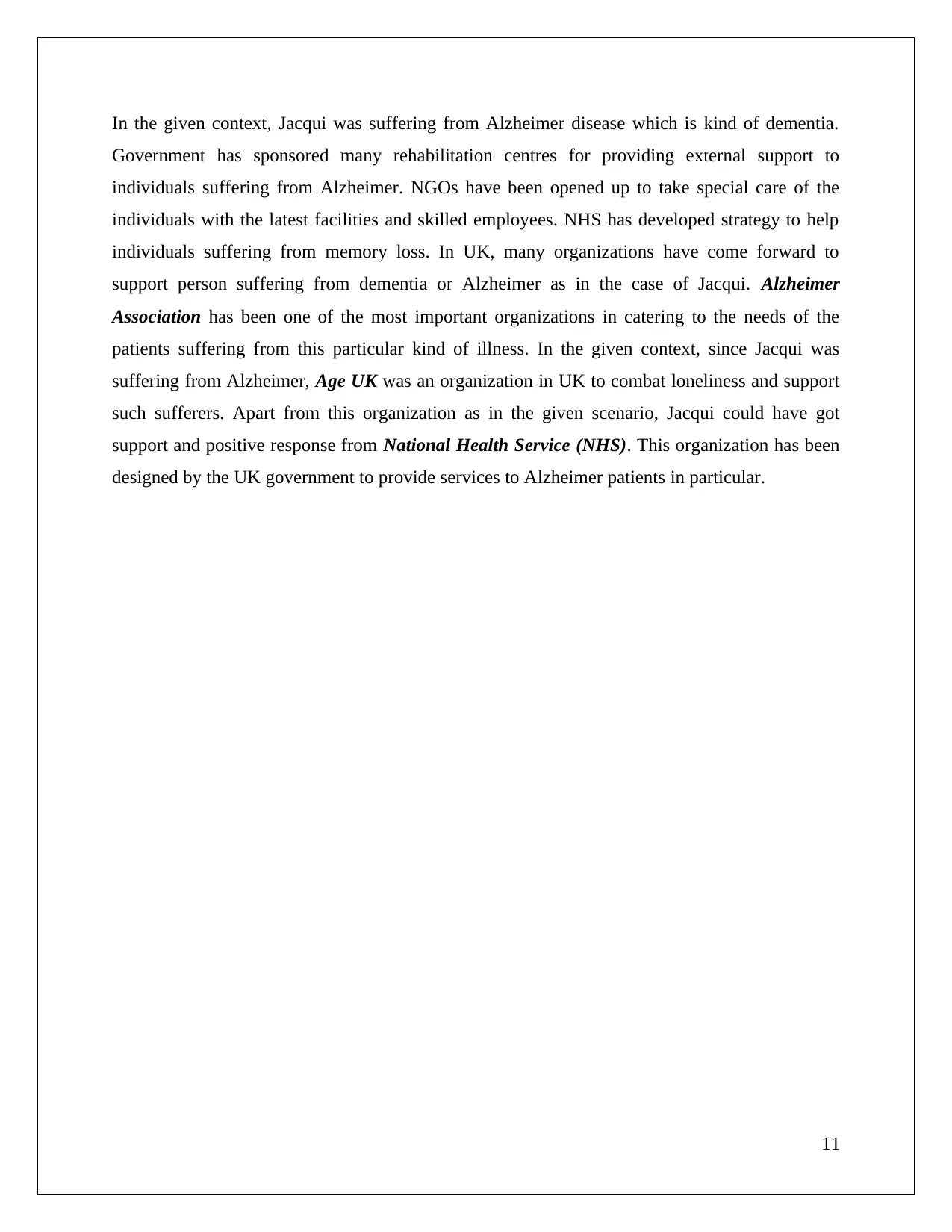
In the given context, Jacqui was suffering from Alzheimer disease which is kind of dementia.
Government has sponsored many rehabilitation centres for providing external support to
individuals suffering from Alzheimer. NGOs have been opened up to take special care of the
individuals with the latest facilities and skilled employees. NHS has developed strategy to help
individuals suffering from memory loss. In UK, many organizations have come forward to
support person suffering from dementia or Alzheimer as in the case of Jacqui. Alzheimer
Association has been one of the most important organizations in catering to the needs of the
patients suffering from this particular kind of illness. In the given context, since Jacqui was
suffering from Alzheimer, Age UK was an organization in UK to combat loneliness and support
such sufferers. Apart from this organization as in the given scenario, Jacqui could have got
support and positive response from National Health Service (NHS). This organization has been
designed by the UK government to provide services to Alzheimer patients in particular.
11
Government has sponsored many rehabilitation centres for providing external support to
individuals suffering from Alzheimer. NGOs have been opened up to take special care of the
individuals with the latest facilities and skilled employees. NHS has developed strategy to help
individuals suffering from memory loss. In UK, many organizations have come forward to
support person suffering from dementia or Alzheimer as in the case of Jacqui. Alzheimer
Association has been one of the most important organizations in catering to the needs of the
patients suffering from this particular kind of illness. In the given context, since Jacqui was
suffering from Alzheimer, Age UK was an organization in UK to combat loneliness and support
such sufferers. Apart from this organization as in the given scenario, Jacqui could have got
support and positive response from National Health Service (NHS). This organization has been
designed by the UK government to provide services to Alzheimer patients in particular.
11
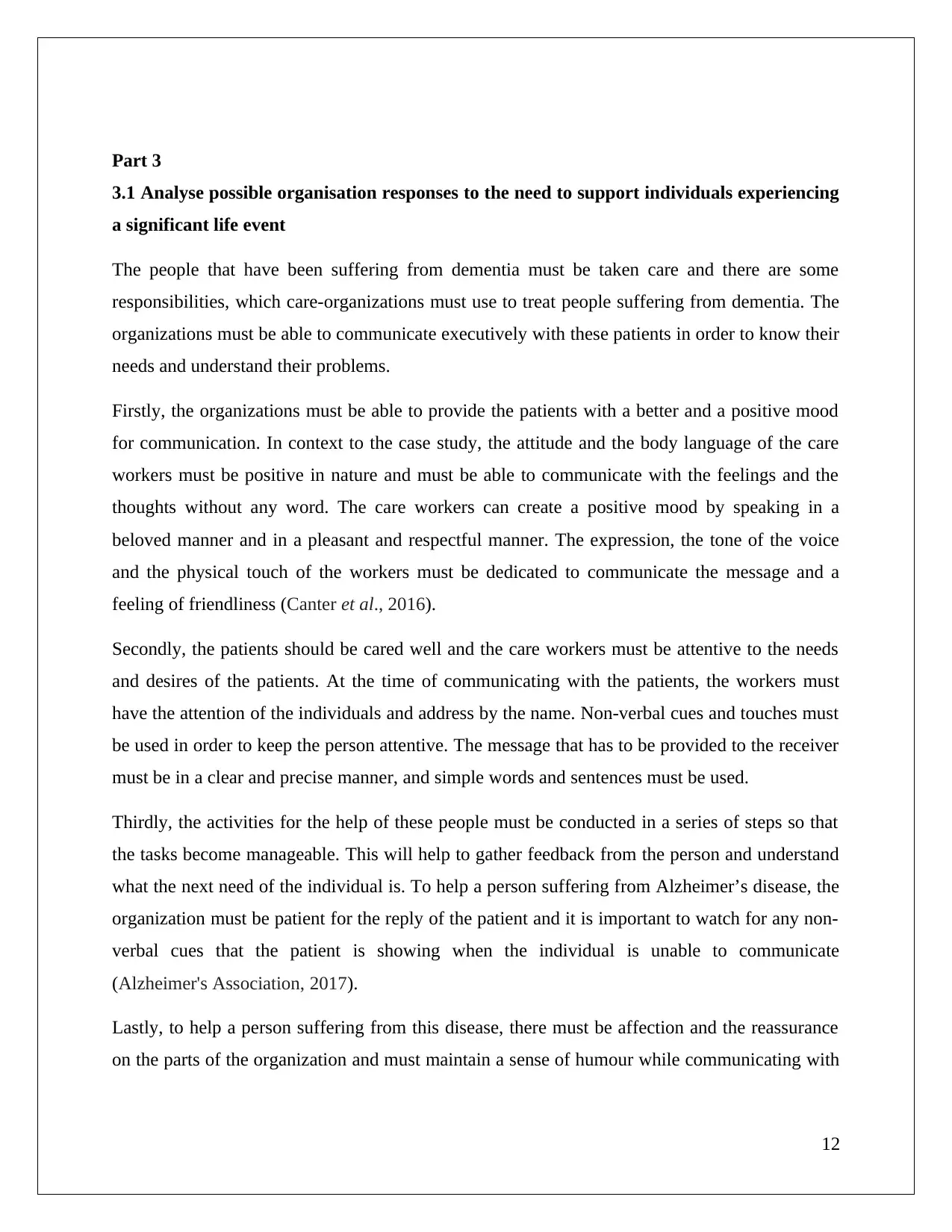
Part 3
3.1 Analyse possible organisation responses to the need to support individuals experiencing
a significant life event
The people that have been suffering from dementia must be taken care and there are some
responsibilities, which care-organizations must use to treat people suffering from dementia. The
organizations must be able to communicate executively with these patients in order to know their
needs and understand their problems.
Firstly, the organizations must be able to provide the patients with a better and a positive mood
for communication. In context to the case study, the attitude and the body language of the care
workers must be positive in nature and must be able to communicate with the feelings and the
thoughts without any word. The care workers can create a positive mood by speaking in a
beloved manner and in a pleasant and respectful manner. The expression, the tone of the voice
and the physical touch of the workers must be dedicated to communicate the message and a
feeling of friendliness (Canter et al., 2016).
Secondly, the patients should be cared well and the care workers must be attentive to the needs
and desires of the patients. At the time of communicating with the patients, the workers must
have the attention of the individuals and address by the name. Non-verbal cues and touches must
be used in order to keep the person attentive. The message that has to be provided to the receiver
must be in a clear and precise manner, and simple words and sentences must be used.
Thirdly, the activities for the help of these people must be conducted in a series of steps so that
the tasks become manageable. This will help to gather feedback from the person and understand
what the next need of the individual is. To help a person suffering from Alzheimer’s disease, the
organization must be patient for the reply of the patient and it is important to watch for any non-
verbal cues that the patient is showing when the individual is unable to communicate
(Alzheimer's Association, 2017).
Lastly, to help a person suffering from this disease, there must be affection and the reassurance
on the parts of the organization and must maintain a sense of humour while communicating with
12
3.1 Analyse possible organisation responses to the need to support individuals experiencing
a significant life event
The people that have been suffering from dementia must be taken care and there are some
responsibilities, which care-organizations must use to treat people suffering from dementia. The
organizations must be able to communicate executively with these patients in order to know their
needs and understand their problems.
Firstly, the organizations must be able to provide the patients with a better and a positive mood
for communication. In context to the case study, the attitude and the body language of the care
workers must be positive in nature and must be able to communicate with the feelings and the
thoughts without any word. The care workers can create a positive mood by speaking in a
beloved manner and in a pleasant and respectful manner. The expression, the tone of the voice
and the physical touch of the workers must be dedicated to communicate the message and a
feeling of friendliness (Canter et al., 2016).
Secondly, the patients should be cared well and the care workers must be attentive to the needs
and desires of the patients. At the time of communicating with the patients, the workers must
have the attention of the individuals and address by the name. Non-verbal cues and touches must
be used in order to keep the person attentive. The message that has to be provided to the receiver
must be in a clear and precise manner, and simple words and sentences must be used.
Thirdly, the activities for the help of these people must be conducted in a series of steps so that
the tasks become manageable. This will help to gather feedback from the person and understand
what the next need of the individual is. To help a person suffering from Alzheimer’s disease, the
organization must be patient for the reply of the patient and it is important to watch for any non-
verbal cues that the patient is showing when the individual is unable to communicate
(Alzheimer's Association, 2017).
Lastly, to help a person suffering from this disease, there must be affection and the reassurance
on the parts of the organization and must maintain a sense of humour while communicating with
12
⊘ This is a preview!⊘
Do you want full access?
Subscribe today to unlock all pages.

Trusted by 1+ million students worldwide
1 out of 24
Related Documents
Your All-in-One AI-Powered Toolkit for Academic Success.
+13062052269
info@desklib.com
Available 24*7 on WhatsApp / Email
![[object Object]](/_next/static/media/star-bottom.7253800d.svg)
Unlock your academic potential
Copyright © 2020–2026 A2Z Services. All Rights Reserved. Developed and managed by ZUCOL.




